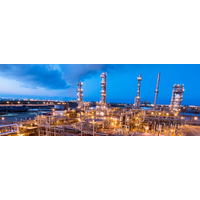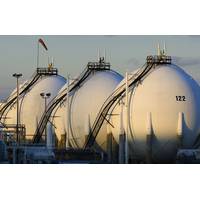Hennigan Tapped as New Marathon CEO

Marathon Petroleum Corp.named Michael Hennigan, the head of its midstream business, as its new chief executive officer effective immediately.Hennigan replaces Gary Heminger, whose departure was announced last year when the largest U.S. independent refiner launched a sweeping restructuring that included the spinoff of its Speedway retail operation.Reuters reported last week that Marathon was considering a sale of assets worth as much as $15 billion at its midstream business MPLX LP, looking for a cash boost at a time when a looming economic slowdown triggered by the coronavirus outbreak and lower oil prices weighed on its prospects.(Reuters)
New CEO for Marathon After Hedge Fund Campaign
Marathon Petroleum Corp chief Gary Heminger will leave the company next year after almost a decade in charge, launching sweeping changes demanded by investors at the biggest U.S. refiner including the spinoff of its Speedway retail arm.The departure is a victory for activists Elliott Management, DE Shaw and others who had sought the changes following the 2018 acquisition of rival Andeavor.That $23 billion deal gave Marathon a coast-to-coast refining network but delivered results that disappointed and its shares fell to a two-year low this year.Marathon said Chief Executive Officer Heminger would retire next year when his current term ends.
ExxonMobil Seeks to Sell Montana Refinery

Exxon Mobil Corp is seeking a potential buyer for its roughly 60,000 barrel per day Billings, Montana refinery, according to three sources familiar with Exxon’s plans.Representatives for large refiners, including Valero Energy Corp and Marathon Petroleum Corp, have toured the refinery, two of the people said, speaking on condition of anonymity because the process is private.Ultimately a smaller refiner could be a more likely buyer of the plant, one of the sources said.Exxon and Valero could not immediately be reached for comment.
US Buyers Turn to Offshore Crude

U.S. sanctions on Venezuela's oil industry have made winners out of Royal Dutch Shell Plc and BP Plc, Gulf of Mexico offshore heavyweights, as refiners in need of substitutes are scooping up oil produced in the region.Those two companies produce notable amounts of crude oil that refiners have settled on as the immediate replacement for the heavy Venezuelan crude that U.S. refiners relied on for years. Trading volumes in these grades of oil have surged to the highest in months, and prices touched five-year peaks after sanctions were imposed.U.S. production has surged to a record 12 million barrels a day, but less than 5 percent of that is heavy oil.
Valero, Marathon Beat Profit Estimates as Refining Margins Rise

Two of the biggest independent oil refiners in the United States beat Wall Street profit estimates on Thursday as greater processing of cheap, light crude from West Texas helped boost margins.Shares of Findlay, Ohio-based Marathon Petroleum gained as much as 7 percent to $79.43, while those of San Antonio, Texas-based Valero Energy Corp rose 4 percent to touch $113.53.Most refiners in the United States process heavy crude from countries such as Venezuela or Canada into diesel, gasoline and other products, but the U.S. shale revolution…
Marathon Creates Top U.S. Refiner with Andeavor Acquisition
Marathon paying $152/share to create biggest independent refiner; Andeavor assets include pipelines, refineries, gas stations. Marathon Petroleum Corp said on Monday it would buy rival Andeavor for more than $23 billion, forming a company that would leapfrog Valero Energy Corp as the largest independent U.S. refiner by capacity. Shale oil fields have pushed U.S. crude production to record highs and industry experts argue operations that have capacity to refine light crude like Andeavor will be better positioned to take advantage of the boom.
U.S. Midwest Refiners Boost Output
U.S. refineries from Ohio to Minnesota are capitalizing on access to cheap crude from Western Canada and North Dakota oilfields, helping their region break a historic dependence on fuel from the Gulf Coast while redrawing oil trade maps. Since the early 2000s, crude and fuel flows from the Gulf Coast into the U.S. heartland have been cut in half, as crude coming from Canada and North Dakota has pushed U.S. Midwest refining activity to record levels. In 2016, Midwest refining capacity rose to 3.9 million barrels per day (bpd) of crude, the highest annual volume on record.
Marathon Processed Record Crude Volumes in 2Q
Marathon Petroleum Corp processed a record 1.9 million barrels per day of crude oil at its seven U.S. refineries in the second quarter, fueled in part by robust refined product exports, the company's chief executive said on Thursday. U.S. exports of refined products have been a bright spot in the U.S. refining market this year. CEO Gary Heminger said the flows should continue to support strong refinery runs through the remainder of the year. "Export markets, which have been important to the high utilization of our refineries, are expected to remain robust," he said on an earnings call.
U.S. Refiners Bet Big on Refined Export Markets
U.S. refiners have come out of maintenance season betting that big exports to Mexico and South America will help alleviate high product inventories and boost margins as the critical summer driving season nears. The first wave of earnings results from several large independent U.S. refiners showed that they are not chasing U.S. gasoline profits, due to already high inventories and steady-but-not-spectacular demand. Instead, they are taking advantage of demand from places like Mexico and South America, where sputtering local refineries cannot meet customer needs.
Marathon Sheds Assets to MLP
Marathon Petroleum Corp said on Wednesday it sold some terminal, pipeline and storage assets to MPLX Inc, the master limited partnership that it spun off in 2012, for $2.02 billion. Ohio-based Marathon has said it would speed up asset sales to MPLX and consider a separation of its Speedway retail business in response to pressure from activist hedge fund Elliott Management to boost its stock price. "This drop-down of additional high-quality logistics assets to MPLX represents the first of several drops expected to occur in 2017…
Marathon CEO: Consumers Will Bear Brunt of any Border Tax
Marathon Petroleum Corp's chief executive officer said on Wednesday the company would pass along any costs incurred under a Republican-backed plan to impose a tax on crude oil and other imports. The border-adjusted tax being considered in Washington would eliminate corporate income taxes on U.S. exports, including crude oil and refined products, while imposing a tax as high as 20 percent on imports. Marathon, like other U.S. refiners, imports a significant amount of crude oil. It imports roughly 700,000 barrels per day of oil, mostly from Canada and Saudi Arabia, for its 1.6-million-bpd refining network, according to the latest figures from the U.S.
Marathon Petroleum Profit Misses; Strategic Moves Planned
Marathon Petroleum Corp reported a much smaller-than-expected quarterly profit on lower pricing and said it would place some assets into MPLX Inc, the master limited partnership that it spun off in 2012. These assets would contribute about $350 million of annual earnings before interest, taxes, depreciation and amortization by the end of 2017. Shares of Marathon were down 4.4 percent at $42.30 in morning trading, while MPLX rose 4.3 percent to $33.28. The 2012 spinoff of pipelines and other midstream assets came after pressure from activist hedge fund Jana Partners, which remains a Marathon shareholder.
Refiners on Track to Spend Record on US Clean Fuel Standards
Major refiners like Valero Energy Corp are on track to pay record amounts this year for credits to comply with U.S. renewable fuel rules, corporate filings show, a trend that hurts profits and has some looking to export more to avoid the cost. Refiners and fuel importers are required to meet a U.S. biofuel quota of roughly 10 percent through blending products like ethanol into gasoline and diesel. If they fall short, they can buy credits generated by companies in compliance. But the cost of the credits, known as Renewable Identification Numbers (RINs), has jumped. The rising costs have hurt a sector already struggling with huge global fuel stockpiles.
Refiners: Cheap Gasoline Demand Will Grow
The largest U.S. independent refiners are bullish on domestic gasoline demand as super-cheap fuel and the lure of bigger vehicles entice more consumers. Valero Energy Corp and Phillips 66 both say they are in "max gasoline mode," pumping out as much as they can as a mild winter, economic uncertainty and a stinging slump in oil drilling squeezed U.S. diesel demand. They still see export demand growth for both gasoline and diesel, but at home expectations are for rising gasoline demand, despite concerns the U.S. economy could soften in 2016.
Marathon Petroleum Financials Beats Street
Refiner Marathon Petroleum Corp reported a better-than-expected quarterly profit as low crude costs and strong gasoline demand pushed up margins. U.S. refiners have been pumping out strong profits as a plunge in crude prices widened crack spreads - the difference between the prices of crude oil and refined products. Marathon Petroleum, which was spun off from Marathon Oil Corp, said the crack spread increased to $6.65 per barrel in the fourth quarter from $5.43 per barrel a year ago. The fall in oil prices, however, has resulted in a challenging environment for master limited partnerships (MLP), Chief Executive Gary Heminger said on Wednesday.
Marathon Petroleum Cancels Louisiana Refinery Upgrade
U.S. refiner Marathon Petroleum Corp said it would cancel a planned expansion project at its 522,000-barrel-per-day Garyville, Louisiana refinery. The company had said in February that it would defer the final investment decision on the project to convert residual fuel to diesel using hydrogen. The decision to scrap the residual oil upgrader (ROUX) is expected to cost Marathon Petroleum up to $2.5 billion and comes amid a slump in global crude oil prices. "While we still believe the ROUX is an excellent project to enhance MPC's platform…
Marathon May Step Away from Refineries to Add Alkylate Capacity
The biggest refiner in the U.S. Midwest is eyeing an unusual place to make more of a key ingredient for premium gasoline: the natural gas fields of eastern Ohio instead of an urban refinery. Marathon Petroleum Corp is after alkylate, which gives premium gasoline its high-octane punch. Although U.S. gasoline demand had been trending down since the peak in 2007, it is up more than 8 percent compared to a year ago as pump prices plunged alongside global crude prices, according to U.S. government data. As part of that, more motorists are choosing to buy higher octane premium gasoline.
Marathon Petroleum Aims to Integrate 2 Texas Refineries
Marathon Petroleum Corp is aiming to integrate its Texas refineries as part of a plan to increase diesel fuel output, Chief Executive Gary Heminger told analysts on Tuesday. The company plans to take its 451,000 barrels per day (bpd) Galveston Bay refinery and its adjacent 84,000 bpd Texas City refinery and "merge them from a process standpoint and build one hydrotreater between the two," Heminger said during a webcast presentation at the Credit Suisse Energy Summit. He did not provide specific timing for the hydrotreater project.
Capline Owners Announce Study of Future Operations
Marathon Petroleum Corp and other owners of the 1.2-million-barrel-a-day Capline crude oil pipeline, which runs from the U.S. Gulf Coast to Patoka, Illinois, said they would study options for it as supplies expand in North America. Traders and analysts have speculated that the line could be reversed to carry Canadian crude to U.S. Gulf Coast refineries. Marathon Chief Executive Officer Gary Heminger said in December that the company might consider reversing the pipeline but that another pipeline would be needed to carry crude from south to north.
Refiners Seek Jones Act Workarounds as Crude Export Debate Heats Up

As the first U.S. oil condensate exports head to Asia from the Gulf Coast, crude producers and refiners are exploring ways to get around a century-old law that makes it three times more expensive to ship by water between U.S. ports than to sail to a foreign port. The Jones Act, originally passed to protect the U.S. maritime industry, restricts passage between U.S. ports to ships that are U.S.-built, U.S.-flagged and U.S.-crewed. If oil exports pick up pace while the Jones Act is left in place, U.S. crudes discount to Brent will likely narrow from its $8 average through 2014…